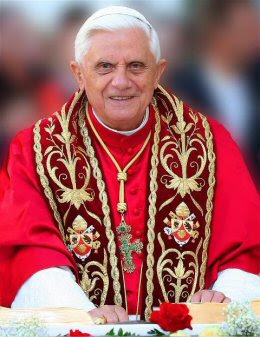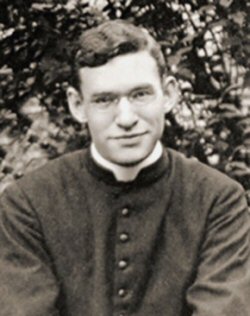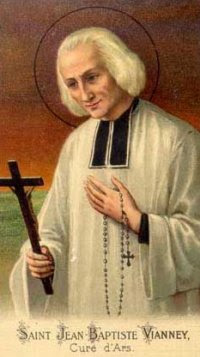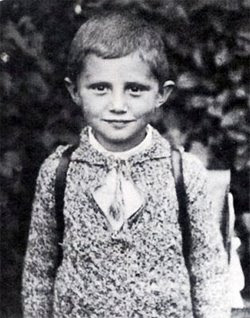
Sister Mary Catharine Perry, a cloistered nun, has written a novel called
'Amata Means Beloved,' offering a glimpse into the life of a monastery like the one she lives in. Photo by Bob Karp / Daily Record
A nun's storyBy Lorraine Ash, Daily Record
Sixteen cloistered Dominican nuns in white habits and black veils lined the narrow hallway outside the refectory at the Monastery of Our Lady of the Rosary in Summit. They faced each other and prayed for their benefactors in voices so practiced they seemed as one.
Precisely at noon, the nuns streamed into the refectory and before long were on a long and orderly line into the kitchen, where they filled their plates with food served family style. The menu: lentil loaf, roasted potatoes, mixed vegetables and thick homemade chocolate chip cookies.
Their friendly chatter came to a halt when they took their seats in the refectory. For 20 minutes they ate in silence while listening to part of a spirituality lecture.
Thirty-five-year-old Sister Mary Catharine Perry rose to point out the title of the lecture - "Philosophy and Religion in the West" by Professor Phillip Cary.
"Lots of time we take this opportunity to listen to a course on tape," she explained.
It's just the kind of glimpse into monastic life that Sister Mary Catharine, a novelist, wants her readers to have - an authentic one.
"Amata Means Beloved" (iUniverse, .95), her first novella, published last month, tells the story of Emily Barone from the day she enters the doors of the fictional Mater Christi Monastery, a simple white building with a cross jutting up from the roof. The plot follows Emily, destined to become Sister Maria Amata, as she acclimates to the life of a cloistered nun.
The young Emily, fresh out of college, wonders whether she is giving herself to God or running from her inability to forgive the man who murdered her brother.
The simple plot, which revolves around a new bell that arrives at Mater Christi, counterbalances the careful evolution of Emily's complex inner life and epiphanies as she adjusts to her new role. The book is a rare look into the cloistered life as told by one who lives it.
Nuns, insists Sister Mary Catharine, are as human as anyone else. Each has her strengths and weaknesses and each enters the convent with experiences and talents from her former life, which makes for interesting conversation and relationships inside the walls of the monastery. Sister Mary Catherine, who hails from Massachusetts, worked as a pharmacy assistant before entering the monastery 12 years ago.
She attended college for a little while, but not long, because she had a vocation in mind and did not want to pile up debts.
When asked why a novel by a cloistered nun has been so hard to come by, her answer came quickly.
"That's what I'd like to know," she said, eyes twinkling. "Cloistered nuns have written many books, but not novels, which are sometimes considered secular, maybe distracting. Some friars think, Nuns just don't do this. But for Dominicans, everything that's good has something of God in it and why not a novel? I like the novel form because I've always felt you can get more from a story."
She drew inspiration from the three-volume serial novel "Kristin Lavransdatter," the story of a 14th-century woman by Norwegian author and Nobel Prize winner Sigrid Undset. Sister Mary Catharine had other inspirations as well.
"I'm tired of stereotypes of monastic life," she said, citing two novels as examples - "Lying Awake" by Mark Salzman and "Mariette in Ecstasy" by Ron Hansen.
The first is about a nun who discovers her spiritual raptures and writings may be due to temporal lobe epilepsy, while the second is the story of a nun who, during ecstasy, experiences stigmata - bodily marks and sensations that correspond to the wounds Jesus endured during his crucifixion.
"Some books are written well but not true to life," Sister Mary Catharine explained. "They make nuns seem slightly infantile, and there usually are undertones of sexual repression in the story. They also make life in a monastery more dramatic than it is. There is a drama going on, but it's hidden."
The spiritual growth of her character, Sister Maria Amata, reflects just such a quiet drama, which culminates in a grounded yet joyful personal breakthrough for the fledgling nun at the end. But the life of perpetual prayer that the nuns enter is not so much about them as others.
"We are not just here for ourselves. We are here for other people in the world," Sister Mary Catharine explained. "People see us as removed from the world, but cloistered nuns are the most present in the world. God gives us empathy for the problems of others."
Often people walk in off the street to talk with one of the 16 nuns at Our Lady of the Rosary, meeting them in the parlor where several one-on-one conversations can take place simultaneously. The nun sits on one side of an opening similar in size and shape to a large window while the visitor sits on the other. People bring their personal and family problems and seek guidance, Sister Mary Catharine said. The conversations are a form of preaching, in accordance with the Dominican Order, known as the Order of Preachers and founded by St. Dominic in France in 1206.
The nuns also preach to each other, according to Sister Mary Catharine, who views her literary ability as another means to the same ends. She writes, she says, to glorify God.
Other nuns in the community helped with the production of the novel, and some like to tease about it. Sister Judith Miryam took the cover photo for the book, which shows a young novice, white veil flowing, her back to the camera, gazing out a monastery window. The novice photographed is Sister Marie Dominique.
Sister Maria of the Cross, who translates church documents, edited "Amata."
In the community room one recent day nuns darted in and out, picking up items at their individual desks, tending to daily routines.
"Is Sister Mary Catharine's novel any good?" said Sister Mary Daniel, laughing. She winked. "I don't know. I haven't had time to read it yet."
Another chimed in: "Sister Mary Catharine said she wanted to create a fictional monastery just like she would want a monastery to be."
"Our author is already cooking up another story, you know," said Sister Maria of the Cross.
The nuns do not watch news but do read a lot. Their community room, across the hall from the Choir at the center of the 1921 monastery, reflects both their devotion to each other, the church and the world.
Around the perimeter and in the middle of the room are desks and chairs, each a depository for an individual nun's personal belongings or for community property. There is a copy of the Bible and the National Geographic Atlas of the World, a stack of Yankee magazines, a box of Baci chocolates, a fax, a television and a computer to surf the Net and send and receive e-mail.
Someone's favorite blue recliner is positioned at the back window to oversee the snow-covered graveyard, filled with graves marked by simple crosses.
A large color photograph of a young Pope John Paul II looks over the room. A Time magazine special edition on the capture of Saddam Hussein is open, as if someone is in the middle of reading it.
All this is the better to fuel the nuns' knowledge of the importance of their prayers. They pray for the world all the time. Several times a day most of the nuns congregate in the Chapel and Choir for hymns and readings, a practice known as the Divine Office or Liturgy of the Hours. At least one nun is always there, 24 hours a day, so that devotion is perpetual.
"In Divine Office we are deputed to praise God for the whole world," Sister Mary Catharine said. "We have this realization of praying for people who are searching."
She, for instance, always has felt a pull to pray for alcoholics, she added. Only after she had been doing so for some time did she discover her birth father is a recovered alcoholic.
"The Lord is using my prayers," she said. "The people I pray for are unknown to me, but they're known to God. This is a mystery to me, but I love the Lord, and when you love someone, you trust them."
Life at the Monastery of Our Lady of the Rosary requires most nuns to be up at 4:30 a.m. There is a lot to do, including washing and maintenance of the habits, meal preparations, prayers, cleaning and other duties. One recent day the nuns baked stollens for their close friends and benefactors.
Finding time to write on this structured schedule is not always easy, but Sister Mary Catharine found that the story of "Amata Means Beloved" poured out of her. She wrote it anytime she could.

"One of the first things you learn in a monastery is to use every minute you've got," she said. "You'd be surprised what you can do in five minutes."
She wrote while on doorbell and phone duty, interrupted, of course, by having to answer the bell and phone. Sometimes she would stay up past bedtime. For novices, lights go out at 10, but for the older, professed nuns, time is not monitored as strictly.
"It's assumed that you're a grown woman and can take care of yourself and that you know you have to be up at 4:30 a.m.," Sister Mary Catharine said. "I would sit up past 10 some nights and say, 'Oh, please, Lord, please.'"
This is the stuff of real life in a real monastery, and it's that reality that readers can expect from "Amata Means Beloved." The novella is filled with engaging scenes showing the industry of and interaction between nuns.
Nuns of the fictional Mater Christi Monastery raise sheep and weave blankets. One scene in "Amata" shows them sitting on the floor of a weaving house loft and cutting dried excrement off fleece. The conversation reveals one nun's life prior to entering the monastery.
"Can you imagine what Vogue would think if they saw Sister Regina now?" one sister says, referring to a nun who modeled before entering the Order.
Other elements of the cloistered life surface, too. For instance, nuns' parents at first tend to be furious at their daughters for their decision to be cloistered. Also, many people think the cloistered life is a waste, Sister Mary Catharine said.
"This is not an escape," she said. "When research scientists and artists separate themselves from the world, it's because they need to get more intense. Nobody thinks a scientist is escaping when he just needs to be removed from everything.
"No, this is not an escape. In fact, the biggest realization for a cloistered nun is that she cannot escape herself. Here you can't run off somewhere if you have a problem. You have to deal with things and each other. You can't even drop off the schedule of community life without special permission."
All the permission Sister Mary Catharine needed to publish her book came from her prioress.
"After Sister Mary Martin read the novel, she had some thoughts for me," Sister Mary Catharine said. "For example, she said that when my character, Sister Maria Amata, goes to the Hermitage - a hut with a dirt floor on the monastery grounds - for solitude and retreat, nothing happens. I told her that's fine.
"Everybody tends to think that when a nun goes on retreat she has this awesome experience of God. No. It may happen when she's doing the dishes."
Mundane as it is, that's how things go day in and day out in a monastery, a place demystified just a little more by a tale woven by one cloistered nun who, in articulating her experience, has made some history.
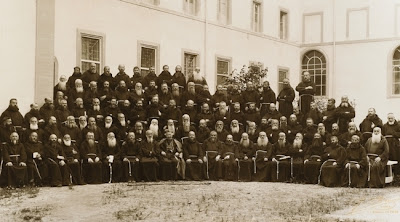 Special thanks to Br. Joseph Mary, O.F.M. Cap., for sending links to the Capuchins (Ordo Fratrum Minorum Capuccinorum) of the St. Conrad Province of Mid-America.
Special thanks to Br. Joseph Mary, O.F.M. Cap., for sending links to the Capuchins (Ordo Fratrum Minorum Capuccinorum) of the St. Conrad Province of Mid-America.




























